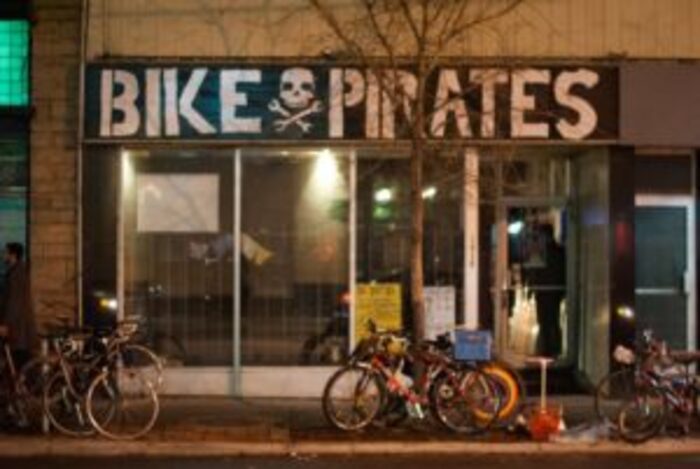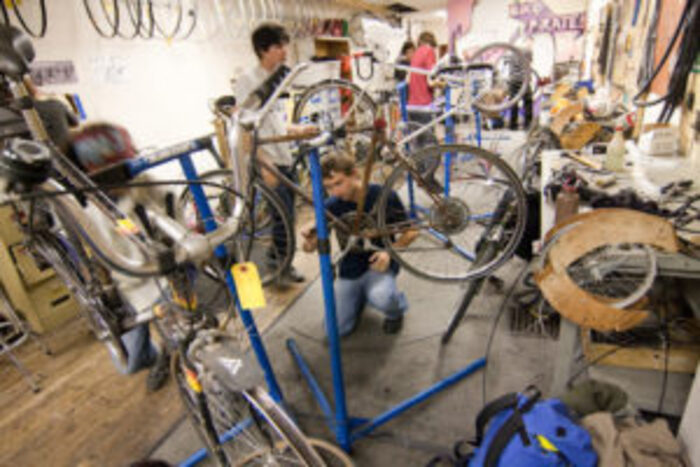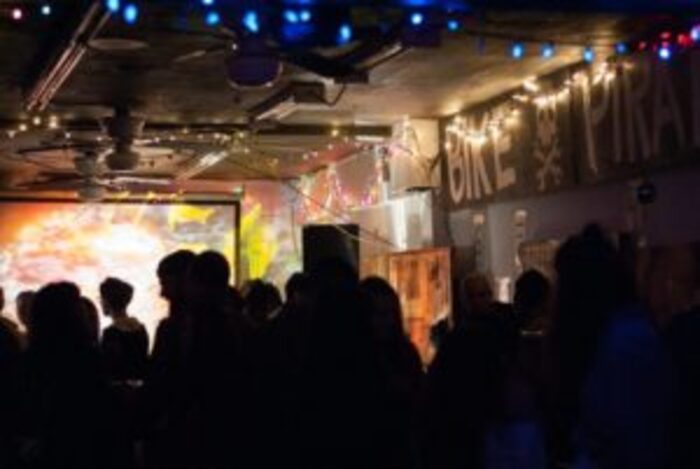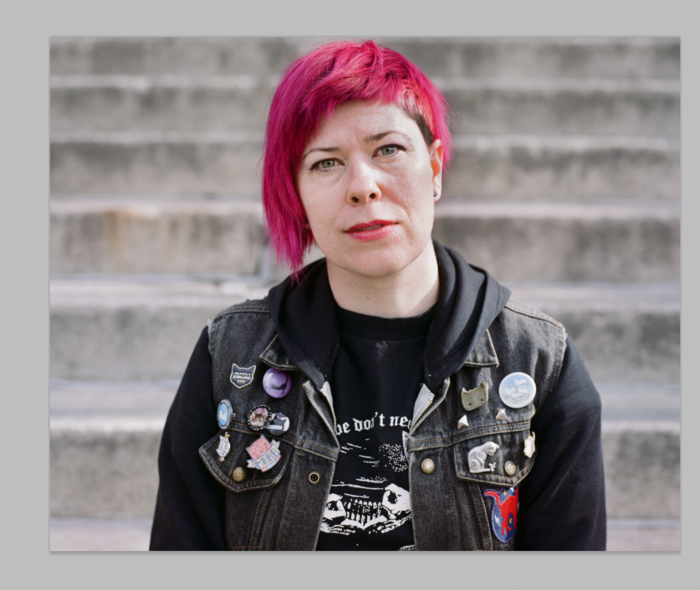Purveyor of: DIY punk-rock community spirit & build-your-own-bike attitude.
Bike Pirates has been an important part of the Toronto cycling community – and increasingly, its music community – for over a decade now. First opened in 2006 on Bathurst south of College (before moving to Bloor & Lansdowne in 2008), Bike Pirates now calls Parkdale home, having opened the doors of its current location at 1416 Queen West in 2015. Unlike a traditional bike shop, Bike Pirates is a volunteer-run not-for-profit collective. They don’t fix your bike for you – in the true spirit of DIY, they teach you how to fix your own bike. If you’re tired of blowing $20 on flat tires and wonky brake pads, Bike Pirates is a great place to gain hands-on experience with bicycle maintenance, to learn more about the two wheels that get you around town, and to even build yourself up a new bike from scratch.
They also host events for fellow non-profits at their shop, and it’s become one of Wavelength’s favourite concert venues. We’re stoked to be collaborating with Bike Pirates for our Doors Open Toronto day-long event this Saturday (May 27), starting with a group bike ride between our official D.O.T. venues during the daytime, and wrapping up with a punk-rock after-party in their Parkdale shop that night. Wavelength’s Jonny Dovercourt spoke to BP co-organizer Ainsley Naylor – also bassist/guitarist in Riot Grrrl punks Come Back Barbara – to find out more about this unique place in the city.
Tell us a bit about yourself, how you got involved with Bike Pirates, and what you do there nowadays?
Hi! I’m a musician and bike mechanic/enthusiast. I moved to Toronto from Halifax about 13 years ago. I got involved in Bike Pirates through a part of the activist community I was a part of, and after becoming more interested in riding and maintaining my own bikes. Right now I am mostly involved in running our Women and Trans* programming on Sundays, and helping with events like the one we are doing with Wavelength!
Without getting too “mission-statement-y,” how would you sum up what Bike Pirates does?
Bike Pirates is a volunteer-run non-profit that provides a community workspace for folks to learn how to fix, build or maintain their own bikes. We also run workshops, offer our space for community events, and participate in events in the community mostly by doing free safety checks.

How did BP get started? Was there a void to be filled in the cycling community in Toronto?
Bike Pirates grew out of the same community that was doing Food Not Bombs in Toronto (free food in public spaces), as more of those folks became interested in maintaining their bikes and helping others do the same. I was doing FNB and knew the kids starting Pirates, and was around the space when the organization was finding its feet in 2006.
BP is proudly volunteer run. What advantages does a volunteer run space have over a traditional business?
For us it is the difference between being able to afford to run the space or not. We run completely on donations – we do not receive any government support, grants, or outside funding – so having paid staff would make it extremely difficult to operate and maintain the accessibility that we strive for. Being volunteer-run is certainly challenging, and tenuous at times, but if we had paid staff our structure would also suffer. There would be power dynamics that our collective (which runs on consensus) might not be able to handle.
What does “DIY” mean to you?
DIY is a political ethos, it is a lifestyle, and it is a form of sharing, taking care of one’s community, and creating self-sustainability. I like to have control over things in my life, and I like to understand how things work, so once I became a regular cyclist I became interested in learning how to maintain my own bike. DIY culture has an element of “getting ‘er done” by whatever means necessary. The people who are around do the work that is required, doing what they need to whether or not they are experts. There’s an element of “scrappiness” to being DIY which I like. I’ve always been scrappy.
BP offers your Sunday opening hours for women and trans people only. Why do you think this is important?
Spaces like Bike Pirates want to be open and accessible to their community, and strive to be a “safer space”, but there is a lot of work to do to be a “safer space” for our communities. We often struggle with a lot of elements of oppression that need to be deconstructed and challenged, and especially in a volunteer organization that is constantly changing, that can be extremely difficult. We live in a society that is at its roots patriarchal and oppressive – sexist, racist, ablest – so we recognize the need to provide intentional spaces for those who may not be able to access our space otherwise. Women and Trans* folks are often not welcome in mechanical spaces, and can be uncomfortable or intimidated in places like bike shops. Cycling has historically been pretty macho and dude-centric.

What are common misconceptions about what BP does?
Some people walk in and just think we are a regular bike shop. Or that we are the Internet cafe that used to be in our space in Parkdale (haha!). Most people come in knowing what we do and are excited to learn to fix their own bikes, but occasionally people come in who don’t know, and their eyes light up when we explain that we are a DIY space, and they are into it!
What is one quick and easy thing the City can do to better support cycling in Toronto?
The City needs to recognize the community organizations (like Bike Pirates and Bike Sauce, etc.) who are doing support work and making bikes and cycling as a means of transportation ACCESSIBLE to those who need it most. Cities some times ignore or take for granted these groups that are doing the work that the City can’t be bothered to do. You can install as many bike lanes as you want, but first folks need to feel like they can ride and access safe bicycles in the city.
And what would one big, expensive thing be, that would make a huge difference?
Well it wouldn’t be expensive by City of Toronto standards, but I would love to see the city funding the organizations that are doing bicycle community work. Other cities actually do this! It would be a drop in the bucket for the City and would make our spaces even more accessible and provide stability. Of course, it would have to be no strings attached and the City probably doesn’t want to hand money over to a bunch of bike punks, haha.
What would you say to someone who’s feeling nervous or fearful about getting started as a bike rider in Toronto?
I try to emphasize two things with cyclists new to Toronto – figure out what works for YOU and where you feel comfortable (some people want to find all of the bike lanes, some want to be on main streets for ease of navigation, some people want to avoid streetcar tracks at all costs!), and no matter what you are doing or where you are riding, BE PREDICTABLE. It’s the least you can do for the other road users. Oh also, check out all of the awesome LANEWAYS around the city.

You make the shop open to non-profits such as Wavelength to use for events (thank you!!). What are some other groups that you have hosted?
We have an ongoing relationship with the IWW (“wobblies”), the Bicycle Messenger Emergency Fund, and in the past have run events for groups like Upping the Anti, Shameless, The Bicycle Ice Race, and No One is Illegal.
Finally, you’ll be hosting the group ride between our Doors Open buildings this Saturday, before finishing off the night with our after-party at Bike Pirates! What can participating cyclists expect?
The ride is going to be lovely! We are going to see a lot of the east end of Toronto which many of us neglect to explore on our bikes. From the waterfront at the RC Harris Water Treatment Plant to the Don Valley trails, biking through the neighbourhoods in the Beaches, and some cool views up along Rosedale Valley Road!
Photo credits:
– Ainsley Naylor by Sarah Bodri
– Wavelength at Bike Pirates by Danielle Burton

